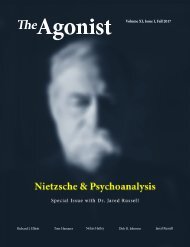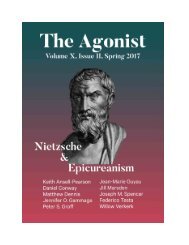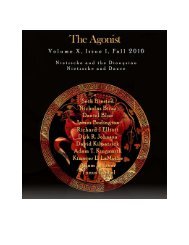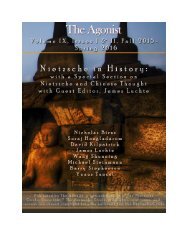Volume XII, Issue II, Spring 2019
You also want an ePaper? Increase the reach of your titles
YUMPU automatically turns print PDFs into web optimized ePapers that Google loves.
THE AGONIST<br />
successful. Friedrich Nietzsche, more so than his precursors or contemporaries,<br />
is the crown-priest of an apocalyptic style of politics. In comparison to the<br />
teleological eschatology of Immanuel Kant, G.W.F. Hegel, and Karl Marx, who<br />
each envision a perpetual peace grounded in liberalism or socialism, Nietzsche’s<br />
apocalyptic eschatology is a more fitting model for contemporary politics. 2 It is<br />
the political principles of modernity which will obstruct social movements and<br />
their demands for effective, immediate response to ecological collapse. As put by<br />
Nancy Rosenblaum: “We face the incapacity of democratic representatives to<br />
engage questions of intergenerational justice, indeed survival.” Democratic<br />
liberalism impedes politics and promises a dismal future. Begrudgingly and only<br />
through accumulating experience, the eternally recurring failure of eco-socialism<br />
will demonstrate the inescapability of a new political paradigm: eco-nihilism.<br />
Nietzsche’s philosophy is prophetic, announcing the horizons of our present, our<br />
politics. More and more, the next century will come to realize that Nietzsche is<br />
the philosopher par excellence who determined the politics of catastrophic climate<br />
change. The death of man is foretold. 3 It is the tragedy of our day that this<br />
pronouncement is realized too late.<br />
Nietzsche’s most well-known maxim first appears half-way through The Gay<br />
Science: “God is dead” (167). The madman announces in the marketplace that we<br />
have killed him. And yet, this pronouncement comes too early. We are trapped in<br />
caves transfixed by the shadows of the old buddhas. Modernity recast theology<br />
into secular institutions; we find transcendence in truth, science, morality, the<br />
state, etc. Vanquishing the resilient shadows of God may end up taking thousands<br />
of years. Nietzsche’s philosophy carries within it, silently affixed in its<br />
subterranean depths and unconscious impulses, vestiges of theology throughout.<br />
Gilles Deleuze asserts that “[w]e distort Nietzsche when we make him into a<br />
thinker who wrote about the death of God... what interests him is the death of<br />
man” (Foucault 129-130). It is we who have killed man. Mistaken that the species<br />
could live forever we sought a new God to dethrone. But in killing nature we<br />
condemned ourselves. It is humanity and our false idols that are finite and nature<br />
and an unredeemable earth that are infinite, capable of ceaseless transformation.<br />
2 The literal meaning of apocalypse refers to the disclosure and uncovering of knowledge.<br />
Eschatology is the study of last things, the end times, theologies concerning absolute<br />
knowledge, death, and the final judgement. In announcing a new messianism, Nietzsche’s<br />
political philosophy reveals much, but arrives after we have lost our faith.<br />
3 I use the gendered term ‘man’ throughout. Some of this is admittedly, regrettably,<br />
stylistic. Nietzsche’s language is gendered. But it also feels reassuring to imagine, even if<br />
rhetorically, the coming catastrophe to be restricted to men.<br />
8









